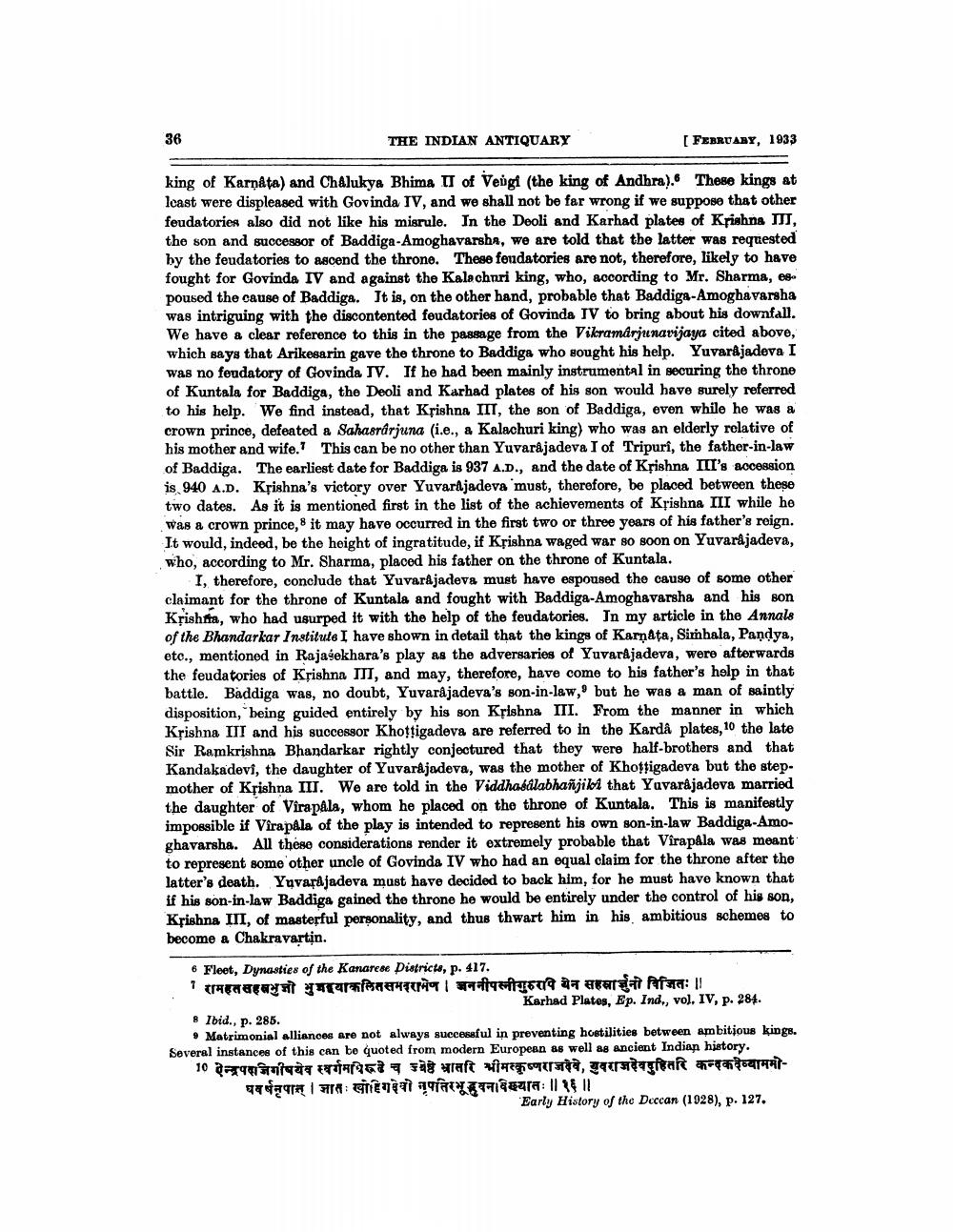________________
36
THE INDIAN ANTIQUARY
FEBRUARY, 1933
king of Karnáta) and ChAlukya Bhima II of Vengi (the king of Andhra). These kings at least were displeased with Govinda IV, and we shall not be far wrong if we suppose that other feudatories also did not like his misrule. In the Deoli and Karhad plates of Krishna IJI, the son and successor of Baddiga-Amoghavarsha, we are told that the latter was requested by the feudatories to ascend the throne. These fendatories are not, therefore, likely to have fought for Govinda IV and against the Kalschuri king, who, according to Mr. Sharma, 68. poused the cause of Baddiga. It is, on the other hand, probable that Baddiga-Amoghavarsha was intriguing with the discontented feudatories of Govinda IV to bring about his downfall. We have a clear reference to this in the passage from the Vikramarjunarijaya cited above, which says that Arikesarin gave the throne to Baddiga who sought his help. Yuvardjadeva I was no fondatory of Govinda IV. If he had been mainly instrumental in securing the throne of Kuntala for Baddiga, the Deoli and Karhad plates of his son would have surely referred to his help. We find instead, that Krishna III, the son of Baddiga, even while he was a crown prince, defeated a Sahasrarjuna (i.e., & Kalachuri king) who was an elderly relative of his mother and wife. This can be no other than Yuvarajadeva I of Tripuri, the father-in-law of Baddiga. The earliest date for Baddiga is 937 A.D., and the date of Krishna III's accession is 940 A.D. Kpishna's victory over Yuvarljadeva must, therefore, be placed between these two dates. As it is mentioned first in the list of the achievements of Krishna III while he was a crown prince, it may have occurred in the first two or three years of his father's reign. It would, indeed, be the height of ingratitude, if Krishna waged war so soon on Yuvarajadeva, who, according to Mr. Sharma, placed his father on the throne of Kuntala.
I, therefore, conclude that Yuvar&jadeva must have espoused the cause of some other claimant for the throne of Kuntala and fought with Baddiga-Amoghavarsha and his son Krishta, who had usurped it with the help of the feudatories. In my article in the Annals of the Bhandarkar Institute I have shown in detail that the kings of Karnata, Sinhala, Pandya, etc., mentioned in Rajasekhara's play as the adversaries of Yuvardjadeva, were afterwards the feudatories of Krishna II, and may, therefore, have come to his father's help in that battle. Baddiga was, no doubt, Yuvarajadeva's son-in-law, but he was a man of saintly disposition, being guided entirely by his son Krishna III. From the manner in which Krishna III and his successor Khoftigadeva are referred to in the Kardå plates, 10 the late Sir Ramkrishna Bhandarkar rightly conjectured that they were half-brothers and that Kandakadevi, the daughter of Yuvarajadeva, was the mother of Khoftigadeva but the stepmother of Krishna III. We are told in the Viddhasdlabhañjil that Yuvarajadova married the daughter of Virapala, whom he placed on the throne of Kuntala. This is manifestly impossible if Virapala of the play is intended to represent his own son-in-law Baddiga-Amoghavarsha. All these considerations render it extremely probable that Virapala was meant to represent some other uncle of Govinda IV who had an equal claim for the throne after the latter's death. Yuvar&jadeva must have decided to back him, for he must have known that if his son-in-law Baddiga gained the throne he would be entirely under the control of his son. Krishna III, of masterful personality, and thus thwart him in his ambitious schemes to become a Chakravartin. 6 Fleet, Dynasties of the Kanarese Districts, p. 417. रामहतसहबभुजो भुमड्याकलितसमवरामेण | अननीपस्नीगुरुरापि येन सहस्रार्जुनी विजितः ।।
Karhad Plates, Ep. Ind., vol. IV, p. 284. 8 Ibid., p. 285.
. Matrimonial alliances are not always successful in preventing hostilities between ambitjous kings. Several instances of this can be quoted from modern European as well as ancient Indian history. 10 ऐन्द्रपदाजिगीषयेव स्वर्गमविकटेच बेष्ठ भ्रातरि श्रीमस्कृष्णराजदेवे, युवराजदेवहितरि कन्तकदेव्याममो97131* entrant Th i ara: || 14 ||
Early History of the Deccan (1028), p. 127.




